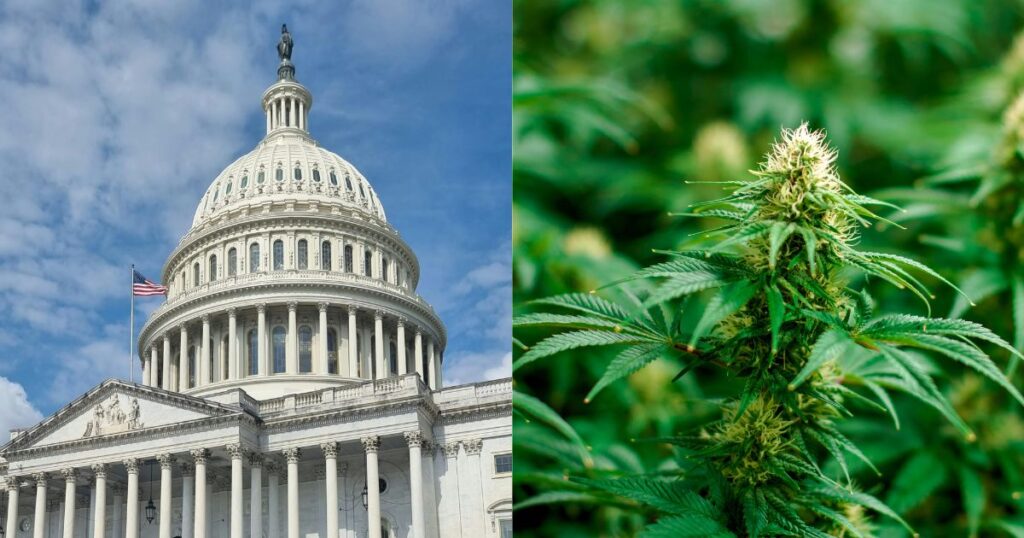The House Appropriations Committee has proposed a spending bill that would prevent federal marijuana rescheduling while simultaneously protecting state medical cannabis programs. The differing provisions reflect the complicated political landscape around cannabis reform.
Yesterday, the National Security, Department of State, and Related Programs Subcommittee passed the Fiscal Year 2026 appropriations bill with an 8-5 vote.
The measure now moves to the full House Appropriations Committee for review. While the bill contains language that would block marijuana rescheduling efforts, it also includes protections for state medical cannabis programs—creating a fascinating contradiction in federal cannabis policy.
The Rescheduling Block: Section 607
The most significant cannabis-related provision appears in Section 607 of the bill, which explicitly states:
“None of the funds appropriated or otherwise made available by this Act may be used to reschedule marijuana (as such term is defined in section 102 of the Controlled Substances Act (21 U.S.C. 802)) or to remove marijuana from the schedules established under section 202 of the Controlled Substances Act (21 U.S.C. 812).”
This language would effectively prevent the Department of Justice from using any federal funds to move marijuana from its current Schedule I classification to a less restrictive schedule. The provision represents a direct challenge to ongoing federal rescheduling efforts that have been under consideration for years.
Medical Marijuana Protection Remains Intact
Despite blocking rescheduling efforts, the bill maintains longstanding protections for state medical cannabis programs. Section 531 continues the traditional rider language that prevents the Department of Justice from interfering with state medical marijuana laws.
The provision protects medical cannabis programs in 45 states, including Alabama, Alaska, Arizona, Arkansas, California, Colorado, Connecticut, Delaware, Florida, Georgia, Hawaii, Illinois, Indiana, Iowa, Kentucky, Louisiana, Maine, Maryland, Massachusetts, Michigan, Minnesota, Mississippi, Missouri, Montana, Nevada, New Hampshire, New Jersey, New Mexico, New York, North Carolina, North Dakota, Ohio, Oklahoma, Oregon, Pennsylvania, Rhode Island, South Carolina, South Dakota, Tennessee, Texas, Utah, Vermont, Virginia, Washington, West Virginia, Wisconsin, and Wyoming.
The protection also extends to the District of Columbia, the Commonwealth of the Northern Mariana Islands, the United States Virgin Islands, Guam, and Puerto Rico.
The Political Irony
The bill’s dual approach reveals a striking contradiction in federal cannabis policy. Congress appears willing to acknowledge the medical value of cannabis by protecting state medical programs from federal interference, yet simultaneously blocks efforts to formally recognize that medical value through rescheduling.
This creates an odd situation where federal lawmakers effectively say: “We recognize cannabis has medical value worthy of protection from federal prosecution, but we refuse to let federal agencies officially acknowledge that medical value through proper scheduling.”
The irony becomes even more apparent when considering that rescheduling marijuana would formally recognize its accepted medical use—the very thing Congress is protecting at the state level.
Moving cannabis from Schedule I (no accepted medical use) to Schedule III (accepted medical use with moderate potential for abuse) would align federal classification with the state medical programs Congress continues to protect.
What Rescheduling Marijuana Actually Means
Marijuana rescheduling would acknowledge what medical cannabis patients and healthcare providers have known for years: cannabis has legitimate medical applications.
Currently, Schedule I classification means the federal government considers marijuana to have “no currently accepted medical use” and a “high potential for abuse.”
Rescheduling would move cannabis to a category that recognizes its medical value while maintaining what the government would consider “appropriate controls”.
This aims to create consistency between federal law and the state medical programs that Congress continues to protect through appropriations riders.
However, they could truly do the right thing by removing cannabis entirely from the Controlled Substances Act (CSA) instead of just rescheduling it.
But let’s be honest—that’s not how the U.S. government operates. They’ll keep dragging it out, and no decision will be made without money being the primary driving factor.
The Path Forward for Marijuana Rescheduling
The bill’s passage through the subcommittee represents just one step in a lengthy legislative process. The full House Appropriations Committee must approve the measure before it can advance to the House floor. Even if it passes the House, the Senate would need to approve similar language for it to become law.
The contradiction between blocking rescheduling while protecting medical cannabis programs may prove difficult to defend politically.
As public support for cannabis reform continues to grow, lawmakers may find it increasingly challenging to justify preventing federal recognition of medical cannabis while simultaneously protecting state medical programs.
The cannabis community now watches as this measure moves through the legislative process, hoping that common sense will prevail over political contradiction. The question remains whether Congress will continue to maintain this illogical stance or finally align federal policy with the medical cannabis programs it has protected for years.
Beyond the Appropriations Process
The appropriations battle represents just one front in the ongoing cannabis reform debate. While Congress considers spending restrictions, the DEA continues its bogged down rescheduling review process, and state-level reforms continue advancing regardless of federal action.
The contradictions in this appropriations bill highlight the need for comprehensive cannabis reform that addresses these inconsistencies.
Until federal law aligns with the reality of medical cannabis use across the country, these political contradictions will continue to create confusion and uncertainty for patients, providers, and policymakers alike.
The cannabis industry and advocacy community must continue pushing for rational, evidence-based policy that recognizes the medical value of cannabis while addressing legitimate regulatory concerns.
The current approach of protecting state programs while blocking federal recognition serves no one’s interests and reflects the dysfunction that has characterized federal cannabis policy for decades.
The path forward requires consistent advocacy and a clear message: if medical cannabis is valuable enough to protect from federal interference, it’s valuable enough for proper federal recognition through rescheduling—or, more logically, to completely remove marijuana from the CSA altogether…





















